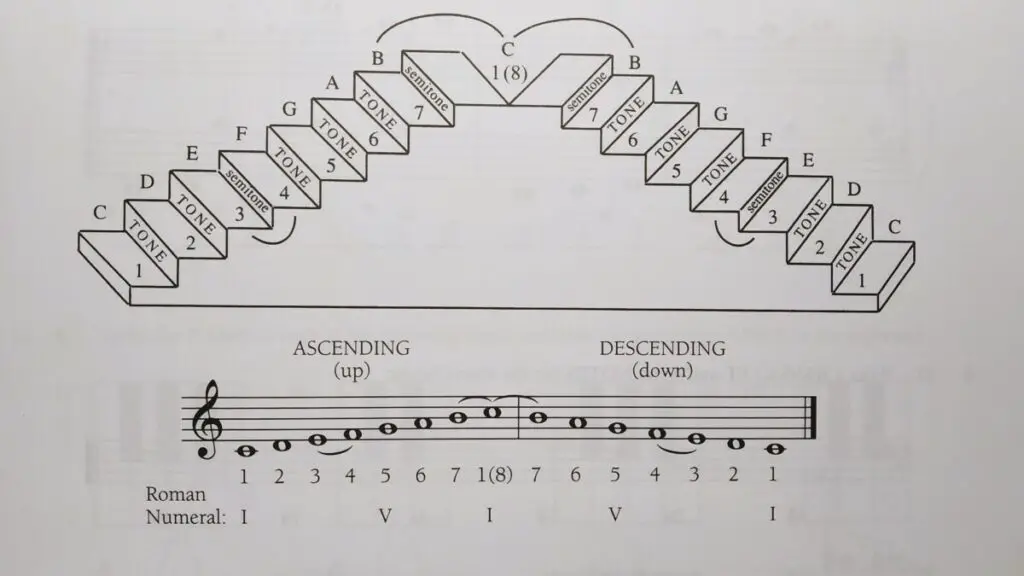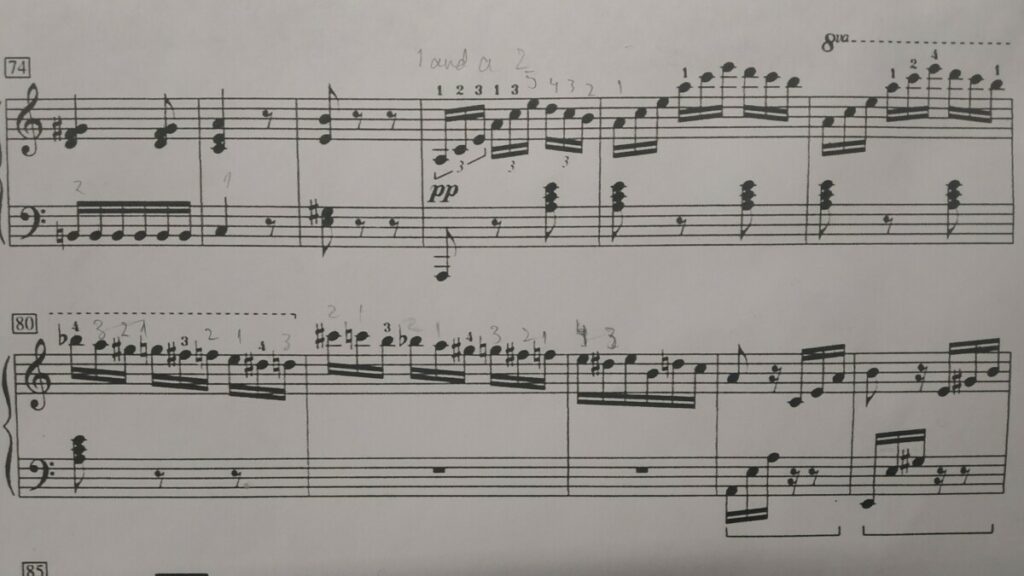This post contains affiliate links.

Let’s be real: practicing piano scales is boring. Personally, I spend 15 minutes every day going through the same scales over and over again. This raises the question: is it possible to learn how to play the piano without learning scales?
Knowing scales isn’t necessary for learning piano. However, scales are great as a warm-up or technical exercise to develop your finger strength and dexterity. Scales also develop improvisation skills. You can pick a few scales you like to practice instead of spending time practicing all scales.
In this article, I’ll go more in-depth about why learning scales aren’t required when learning the piano and why you should learn scales anyway because of the benefits they offer in the long run.
I’ll also convince you that practicing scales don’t have to be hard and give a few tips so that practicing scales can be a bit more bearable.
Can you learn piano without learning scales?
In the end, playing the piano is about hitting the right keys at the right time. This is a gross simplification since there are a lot more aspects to being able to play the piano beautifully.
But what this means is that knowing the theory behind scales and how they work isn’t needed to play the piano. You’ll be fine as long as you can read music sheets and play piano at tempo and keep proper rhythm.
Great pianists like Vladimir Horowitz never practiced scales since he considered them too mechanical and that practicing the piano should be musical.
Furthermore, a lot of classical pieces (even pop) have passages with scales in them. This means you will learn scales naturally as you play through those passages.
Actually, some people learn piano scales more effectively by playing piano pieces with scales passages rather than practicing scales separately since they learn and apply that scale in real time. They can then transfer those skills to the next pieces they’ll learn to play.
It’s similar to auditory learners vs visual learners, where auditory learners learn better by hearing the information, while visual learners learn better by looking at the information on paper or graphs.
Learning scales by playing Bach’s pieces which tend to have a lot of scales passages, can speed up the learning process since you’re hitting two birds with one stone: you’re using time otherwise spent on practicing scales separately to play piano pieces where you can learn scales along with other techniques at the same time.
This is what British pianist Andras Schiff did as he said he practiced scales by playing Bach’s pieces rather than practicing them separately.

Personally, I prefer to practice scales separately since it’s simpler, I don’t need to look for pieces with scales I need to practice, and it’s easier to make a routine practicing them separately.
Test which one works better for you: either practice scales separately or learn them naturally by playing piano pieces. Overall, scales aren’t necessary but can help improve your playing immensely. Here are the reasons why:
Learning piano scales is beneficial to your playing
Scales as a warm-up exercise
Like any other sport where you need to warm up before the match to make your body more flexible and get the blood flowing, we pianists need to warm up our hands to make them nimble before starting any piano piece. Nothing is worse than the frustration you get when your hands freeze up and feel stuck as you play the piano because you didn’t warm them up beforehand.
This is where scales come in: just spending 5 minutes going up and down 2-3 scales of your choice can get the blood flowing to your fingers, giving you better control over them.
Practicing scales are also great if you’re nervous right before a performance or recital since it distracts and calms you down. Practicing scales as a warm-up is also great if you’re planning to play outside where the weather is cold, and your hands are freezing.
Easier time playing pieces with scales in them
As mentioned above, scales appear a lot in classical and pop pieces. So if you’re familiar with scales because you practice them daily, you will have an easy time breezing through those passages as you’re used to the fingering positions needed and can play them comfortably at fast tempos.
This even applies to scales that you’ve never seen before. Although different scales have different fingerings, the fundamental motions of moving your fingers up and down the keyboard are the same and can be applied to new scales you’ve never played before.
For example, take Fur Elise by Ludwig van Beethoven – a very famous piece that many pianists are sick of hearing since it’s so popular. In the final section of the piece, there’s a descending chromatic scale that goes from a high E to an E two octaves down.
While it doesn’t resemble any major scales we know of, if you’ve already practiced some scales with black keys like D Major or E Major, you’ll have an easier time playing through this since it could be tricky hitting the black keys without your fingers slipping off or getting your fingers to fit in between 2 white keys, especially when playing scales at a fast tempo like in this piece (sixteenth notes).

Develop finger strength and dexterity
Strong and dexterous fingers are important assets of a great pianist. Strong fingers mean you play loud notes louder and quiet notes softer. Dexterous fingers mean they are flexible and can reach further notes or play passages with tricky fingerings. Overall, they give you better control of the piano.
Practicing scales is the best way to develop strength in your fingers because you need to play the scale equally, with no notes louder than the next one. Your fingers become more dexterous as you learn how to tuck your thumb to play a scale in two octaves and different fingering positions needed for different scales.
Help with your improvisation
If you’re interested in learning jazz at some point, know that jazz is all about improvising, and the best way to learn to improvise is by learning scales.
This is because, first of all, jazz chords are built based on scales. So if you know your scales well, you’ll have an easier time learning and memorizing jazz chords.
Secondly, one of the easiest exercises to do to improve improvisation is to mess around within a scale and see what you can come up with. This will make you more creative and make it easier to improvise on the spot.
Understand music theory better
Scales, along with chords and arpeggios, are the backbone of music theory for many instruments, piano included. By learning scales, you will have a better understanding of why piano music is the way that it is and have a better appreciation of the art you’re performing.
You’ll have an easier time learning piano since you learn to identify key signatures within scales (key signature tells you which notes to sharpen or flatten) and subsequent chords that are made out of them. For example, all major triads are made of the 1st, 3rd, and 5th notes of the major scales.
You want to take the RCM/ABRSM exams
The RCM (Royal Conservatory of Music) exams are well-known and prestigious in North America. Its equivalent in the UK is ABRSM (Associated Board of the Royal Schools of Music). Many piano teachers have their students take these exams because they train students to become well-rounded pianists thanks to their high standards.
While you don’t need to take RCM/ABRSM exams to become great at playing the piano, I find that the levels systems of these exams set clear and attainable goals for me to work towards. Once I pass a level, I have a rough idea of my skill level and what pieces I’m able to play at that level.
So if you’re looking into taking these exams, know that you need to play scales alongside piano pieces in front of examiners during the exams. The scales you need to play are based on the level you’re doing. By learning scales now, you’re setting yourself up for success in the exam room.
Get better at playing with two hands at the same time
For people struggling with playing the piano with both hands at the same time, practicing scales can help them get better at it.
It’s easy to go up and down the scale with either your left or right hand, but it’s significantly harder to play the scale with both hands at the same time because you have to remember the finger positions for both hands as you’re playing the scale.

After learning the benefits of learning piano scales, you may also want to know how long it takes to learn all Major and minor scales out there. Check out How Long Does it Take to Learn Piano Scales?
Learning piano scales doesn’t have to be hard
If you don’t want to learn the nitty-gritty theories behind scales, like the key signatures they are based on, scales can still be great as a warm-up exercise and develop your fingers.
Piano scales aren’t difficult to learn. You can watch Youtube videos of Major scales and do those as practice without needing to understand the theories behind them.
You can create a routine to make practicing scales less dreadful. I find that doing scales every time I sit down at the piano to practice makes them more bearable, and now I don’t find it boring anymore.
Some tips for practicing piano scales
C Major scale is the first to learn since it has all white keys, so you don’t have to bother remembering any black keys. Once you learn the C Major, check out this article to know which scales you should learn next.
When practicing scales, learn each hand separately first before combining and playing with two hands at the same time. When playing with two hands, go at a slow tempo first since it’s trickier to play scales with two hands compared to one.
Once you can play a scale with two hands comfortably at a slow tempo, you can then speed them up. As they said:” If you can play a piece slowly, you can play it quickly.”
You can consider practicing a scale in two octaves once you can play one octave comfortably with two hands at a fast tempo.
You may also wonder how many scales to practice. How long should you spend practicing scales every day? How fast should you be able to play scales? I answer these questions as well in detail in the article How Many Piano Scales Should You Practice Every Day?
Further reading
Knowing that you should learn scales to improve your playing, the next question is whether you need to learn every single scale out there. Check out this article, where I discuss whether you must learn all 24 major and minor scales.

